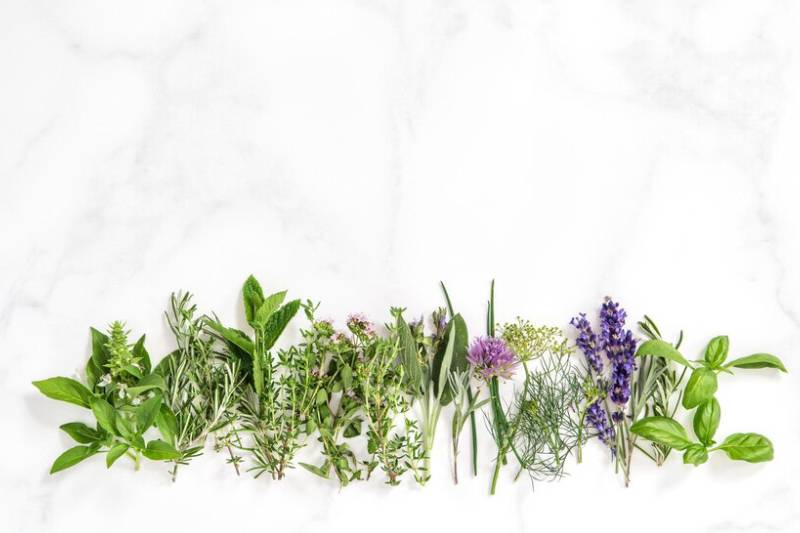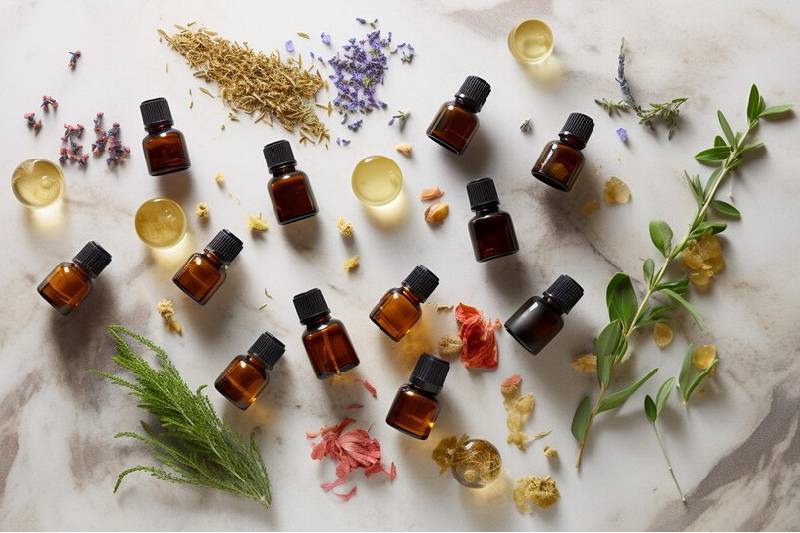Essential Oil Plants: Your Guide To Top 13 Health Boosters

The world of essential oils is a fragrant haven where nature's essence meets human well-being. From promoting relaxation to supporting overall health, essential oils derived from various plants have become integral to holistic living. In this article, we will explore ten essential oil plants that not only contribute to physical health but also create an aromatic oasis for harmony in your life.
What are Essential Oil Plants?
 Essential oils are concentrated liquids extracted from various parts of plants, including leaves, flowers, and roots. The extraction process involves methods like distillation or cold pressing. With a vast array of plants producing essential oils, each type offers a unique scent and therapeutic properties.
Essential oils are concentrated liquids extracted from various parts of plants, including leaves, flowers, and roots. The extraction process involves methods like distillation or cold pressing. With a vast array of plants producing essential oils, each type offers a unique scent and therapeutic properties.
Health Benefits of Essential Oils
Here are some notable benefits:
- Stress Relief and Relaxation: Lavender induces calmness, alleviating stress and anxiety for a relaxed state.
- Immune System Support: Tea Tree's antimicrobial properties offer immune system support, promoting overall health.
- Respiratory Health Improvement: Eucalyptus aids respiratory well-being, opening airways and relieving congestion.
- Enhanced Sleep Quality: Lavender and Chamomile foster better sleep with their soothing properties. Mood Enhancement and Focus: Peppermint boosts energy and sharpens focus, creating a positive, productive atmosphere.
13 Best Essential Oil Plants for Health and Harmony
Let's delve into the top 13 essential oil plants that promote health and harmony.
1. Lavender: The Calming Elixir
Lavender, with its soothing properties, thrives in the Mediterranean region, flourishing in well-drained soil and ample sunlight.
Beyond its delightful fragrance, lavender oil, renowned for its calming effects, aids in reducing stress, promoting better sleep, and soothing minor skin irritations.
Cultivating lavender at home not only adds a touch of natural beauty but also provides a constant source of relaxation.
2. Peppermint: More Than a Refreshing Flavor
Peppermint, with its refreshing scent, is a hybrid of spearmint and watermint, characterized by serrated leaves and thriving in cool climates.
Beyond its culinary delight, this oil offers therapeutic benefits, relieving headaches, improving digestion, and boosting energy.
Adding a few drops of peppermint oil to your diffuser can instantly refresh your living space and invigorate your senses.
3. Tea Tree: Nature's Antiseptic
Native to Australia, the tea tree is an evergreen with needle-like leaves, traditionally used by indigenous communities for its medicinal properties.
Tea tree oil, a potent natural antiseptic with antibacterial and antifungal properties, serves as a go-to solution for various skin issues.
Harness the power of tea tree oil by adding it to your skincare routine for blemish-free and healthy-looking skin.
4. Eucalyptus: Respiratory Relief
 Eucalyptus, originating from Australia, is known for its tall, aromatic trees, and the oil derived from its leaves is a staple in respiratory wellness.
Eucalyptus, originating from Australia, is known for its tall, aromatic trees, and the oil derived from its leaves is a staple in respiratory wellness.
Inhaling eucalyptus oil provides relief from respiratory issues, acting as a decongestant, especially beneficial during cold and flu seasons.
Create a spa-like atmosphere at home by adding a few drops of eucalyptus oil to your shower for a refreshing and invigorating experience.
5. Rosemary: The Memory Booster
Rosemary, a fragrant herb native to the Mediterranean, thrives in well-drained soil and sunny conditions.
Beyond its culinary uses, rosemary oil is believed to enhance memory, concentration, and overall mental clarity.
Incorporate the refreshing scent of rosemary into your workspace to boost focus and productivity throughout the day.
6. Chamomile: The Soothing Herb
Chamomile, available in various species like Roman and German chamomile, is known for its delicate blossoms.
This oil is a natural relaxant, eases anxiety, promotes relaxation, and contributes to a restful night's sleep.
Enjoy a calming cup of chamomile tea before bedtime for a soothing ritual that enhances your sleep quality.
7. Lemon Balm: Citrus Bliss
Lemon balm, a member of the mint family with a lemony fragrance, is easy to grow and thrives in well-drained soil with partial sunlight.
This oil acts as a stress-buster, alleviating tension, uplifting the mood, and contributing to an overall sense of well-being.
Infuse lemon balm into your homemade skincare products for a burst of citrusy freshness that revitalizes the skin.
8. Frankincense: Sacred and Healing
Frankincense, obtained from the resin of the Boswellia tree in the Middle East and Africa, has a rich history in spiritual rituals.
Besides its spiritual significance, frankincense oil offers medicinal benefits and is known for its anti-inflammatory properties and use in skincare.
Elevate your meditation practice by diffusing frankincense oil, creating a sacred and peaceful environment.
9. Patchouli: Earthy and Grounding
Patchouli, recognized by its distinct earthy scent, is a bushy herb originating from Southeast Asia, thriving in tropical climates.
This oil has emotional and skincare benefits, helps alleviate stress through its grounding properties, and is valued for rejuvenating the skin.
Embrace the earthy aroma of patchouli by adding a few drops to your homemade potpourri for a natural and grounding fragrance.
10. Geranium: Floral Elegance with Benefits
Geranium, characterized by vibrant flowers, is native to South Africa and flourishes in various climates.
This oil, a floral elixir with skincare properties, helps balance oil production and uplifts emotional well-being.
Create a personalized floral perfume by blending geranium oil with your favorite carrier oil for a natural and delightful fragrance.
11. Cinnamon Leaf: Warmth and Wellness
Cinnamon leaf oil, extracted from the Cinnamomum verum tree native to Sri Lanka, offers a delightful aroma.
Apart from its pleasant scent, cinnamon leaf oil has immune-boosting and anti-inflammatory properties, contributing to overall wellness.
Infuse the warmth of cinnamon into your home by adding a few drops of cinnamon leaf oil to your household cleaner for a cosy and inviting atmosphere.
12. Ylang Ylang: Exotic Aromatherapy
Ylang-ylang trees, native to the Philippines, produce flowers with a distinct fragrance, and the oil is extracted through a careful distillation process.
Ylang-ylang oil, renowned for its exotic aroma and mood-enhancing properties, is often used in aromatherapy for its aphrodisiac qualities.
Elevate your self-care routine by adding a few drops of ylang-ylang oil to your bath for a luxurious and aromatic experience.
13. Clary Sage: Balancing Act
Clary sage, with its large aromatic leaves, is native to the Mediterranean, preferring well-drained soil and sunlight.
This oil plays a celebrated role in maintaining hormonal balance, acts as a natural remedy for menstrual discomfort, and holds value for its relaxation benefits.
Diffuse clary sage oil in your living space to create a harmonious atmosphere and promote emotional well-being.
Conclusion
We have covered an depth guide on 13 Essential Oil Plants and their health benefits. In the tapestry of essential oils, each plant brings a unique thread of health and harmony. From the calming embrace of lavender to the grounding aroma of cedarwood, these essential oils offer a holistic approach to well-being. As you incorporate them into your daily life, may you find a harmonious balance between mind, body, and spirit.
FAQs
How do I use an essential oil safely?
When applying to the skin, dilute essential oils and ensure well-ventilated spaces for aromatherapy.
Can I ingest essential oils for health benefits?
Approach the ingestion of essential oils with caution and preferably seek guidance from a qualified healthcare professional.
Are there specific essential oils that should be avoided during pregnancy?
Pregnant individuals should consult with their healthcare provider before using essential oils, as some may not be safe during pregnancy.
Can essential oils replace traditional medicine?
Complementing traditional medicine, essential oils should not replace it; instead, seek medical advice from a healthcare professional.
How long do essential oils last?
The shelf life of essential oils varies, but most have a lifespan of about one to two years if stored properly in a cool, dark place.
Related Articles
- 30 Sep 24
Updating Soon The Episodes
- 30 Sep 24
Storing Essential Oils
- 30 Sep 24
What Are Essential Oils
- 30 Sep 24
Science Of Essential Oils
- 30 Sep 24
Happy To Receive Naari Samman Award
- 30 Sep 24
How Are Essential Oils Obtained?
- 30 Sep 24
Gateway To Africa - Istanbul
- 30 Sep 24
Et Global Indian Leader 2022
- 30 Sep 24
Can Essential Oils Help With Self-Care?
- 30 Sep 24
Pain Remedy Essential Oils
- 30 Sep 24
Asian - African Iconic Brand Awards 2022
- 30 Sep 24
Core & Pure Pain Buster Oil
- 30 Sep 24
Tea Tree Essential Oil From Core & Pure
- 30 Sep 24
Business Icon Award
- 30 Sep 24
